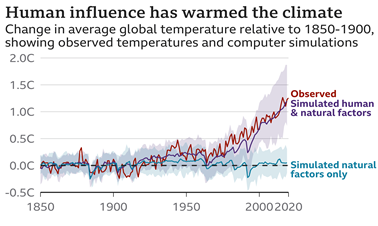

Context
A new report from UN Climate Change shows countries are bending the curve of global greenhouse gas emissions downward but underlines that these efforts remain insufficient to limit global temperature rise to 1.5 degrees Celsius by the end of the century.
Key highlights of the Report:
- According to the report, the combined climate pledges of 193 Parties under the Paris Agreement could put the world on track for around 5 degrees Celsius of warming by the end of the century.
- It also shows current commitments will increase emissions by 6% by 2030, compared to 2010 levels. This is an improvement over last year’s assessment, which found countries were on a path to increase emissions by 7% by 2030.

- The analysis shows that the emissions will no longer increase after 2030.
- Targets defined: The IPCC released earlier this year uses 2019 as a baseline, indicating that GHG emissions need to be cut by 43% by 2030. This is critical to meeting the Paris Agreement goal of limiting temperature rise to 1.5 degrees Celsius by the end of this century and avoiding the worst impacts of climate change, including more frequent and severe droughts, heat waves, and rainfall.
- Focused on Parties' contributions: UN Climate Change analyzed the climate action plans – known as nationally determined contributions(NDCs) – of 193 Parties to the Paris Agreement, including 24 updated or new NDCs submitted after the UN Climate Change Conference in Glasgow (COP 26).
- Contributing partners: Current long-term strategies (representing 62 Parties to the Paris Agreement) account for 83% of the world’s GDP, 47% of the global population in 2019, and around 69% of total energy consumption in 2019. This is a strong signal that the world is starting to aim for net-zero emissions.
- The report notes, however, that many net-zero targets remain uncertain and postpone the future critical action that needs to take place now. Ambitious climate action before 2030 is urgently needed to achieve the long-term goals of the Paris Agreement.
Need for stringent measures against Climate change:
- Declaration of the year 2019 as the second warmest year on record and the end of the warmest decade (2010- 2019) ever recorded.
- Carbon dioxide (CO2)levels and other greenhouse gases in the atmosphere rose to new records in 2019.
- Climate change is affecting every country on every continent. It is disrupting national economies and affecting lives.
- Weather patterns are changing, sea levels are rising, and weather events are becoming more extreme.
- Saving lives and livelihoods requires urgent action to address both the pandemic and the climate emergency.
- The Paris Agreement, adopted in 2015, aims to strengthen the global response to the threat of climate change by keeping a global temperature rise this century well below 2 degrees Celsius above pre-industrial levels.
- This agreement also aims to strengthen the ability of countries to deal with the impacts of climate change, through appropriate financial flows, a new technology framework, and an enhanced capacity-building framework.


